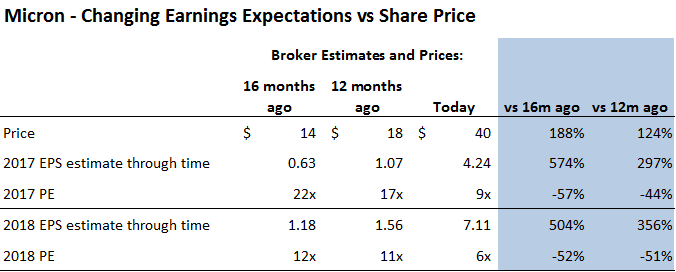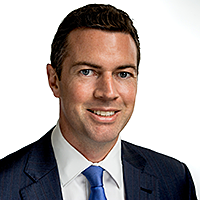This week in tech: Tesla vs Everyone, commute anywhere in under an hour, commercial driverless taxis by Christmas, and how do you invest in this
This week the news was overrun with announcements by car makers expanding their electric vehicle ambitions. Elon Musk presented SpaceX's plans for colonisation of Mars, as well as rockets that could allow commuting to anywhere on Earth in an hour - for the price of an economy ticket. And Google might start a commercial driverless taxi service in just a few months, years ahead of anyone else.
Tesla vs Everyone
Tesla currently dominates the US electric vehicle market with 45% market share. It has a strong brand which is synonymous with electric vehicles, its visionary and vocal leader Elon Musk earns the company a ton of PR and it has a first mover advantage.
But Tesla is a controversial investment. Its stock is one of the most popular to short-sell, with a short interest of around 23% of its float. The not-so-secret short case is pretty simple - it has significant challenges ahead in ramping production, it operates in an ultra-competitive industry and its negative operating cash flow will require financing from the equity or debt markets. Tesla’s revenue is only $10 billion, a fraction of Ford's revenue of $150bn and General Motor's of $165bn, yet its market cap is US$59 billion, bigger than Ford's at US$48 billion and similar to General Motors at $64 billion.
Despite the simplicity and logic of the short case, shorting has been a painful trade with the shares up 77% over the last year.
Whether Tesla thrives is still to be proven. But it is sure to go down in history for forcing the entire automotive industry to pivot to electric vehicles. It’s latest car, the Model 3, costs $35,000 for the basic version, and is its first car cheap enough to appeal broadly. As Tesla moves into the mass market it becomes a real threat to the entire automotive industry.
Tesla delivered its first Model 3 cars on July 28, and the rest of the industry has been scrambling to tell investors and customers that they aren’t falling behind.
Last week I wrote about Dyson, the company famous for its vacuums, which announced internally that it was developing an electric vehicle that would be launched by 2020.
On Monday General Motors declared it believes in “an all-electric future”. They will launch two new fully electric vehicles by next year, with 20 new EVs coming by 2023. GM is planning 10 plug-in hybrid or EV models in China by 2020. (VIEW LINK)
On Tuesday Ford announced plans to cut $14 billion of costs in legacy areas over 5 years, and is forming a dedicated in-house electric vehicle team (“Team Edison”). The name is a clear shot at Tesla: Thomas Edison and Nikola Tesla famously had a heated rivalry about direct current vs alternating current. Ford’s new team will help deliver the existing plan of 13 new hybrid and EVs by 2022, investing $4.5 billion by 2020.
Other automakers have also made announcements recently:
- Mercedes (Daimler AG) plans to spend $1bn to prepare its 20-year-old Alabama factory for EV production. (VIEW LINK). The company aims to offer electric versions of all of its models by 2022 and EVs to be 15-20% of sales by 2025
- BMW plans 15-25% of all sales to be EVs by 2025
- Volkswagen plans to introduce at least 80 new EV models by 2025 and expects to invest $24 billion in electric vehicles by 2030. More than 25% of sales to be electric by 2025
- Volvo announced it would introduce 5 new EV models between 2019 and 2021, and all models will have hybrid or plug-in options
- Toyota plans to introduce an EV model in the early 2020s
- Honda expects two-thirds of company sales to be EVs by 2025
- The Chairman of China’s BYD said he expects China to be 100% electric by 2030. Geely expects 35% of its vehicles to be pure EV and 90% EV or hybrid by 2020, and BAIC expects 500 thousand EV sales annually by 2020
Interplanetary colonisation - SpaceX to reach Mars by 2022
Tesla’s Elon Musk probably wasn’t thinking too much about competitor's announcements this week. He was in South Australia at the 2017 International Astronautical Congress, and spoke in depth about SpaceX’s plans for interplanetary colonisation. Writing those last two words feels absurd. Isn’t this science fiction?
SpaceX’s goal is to land at least 2 cargo missions on Mars by 2022. These first missions will confirm water resources and put in place power, mining and life support systems to support future missions. By 2024 the company plans to fly four ships, including two crewed ships, and to build up a base in preparation for expanding across Mars and eventually a city.
SpaceX will start building its next generation ship in the next 6-9 months, and Musk is “very confident” they can do the first mission in about five years. He is famous for setting timelines that are too ambitious, but even if it takes a few extra years this sort of progress is extraordinary.
TechCrunch article: (VIEW LINK)
Travel anywhere on earth in under an hour, for the price of an economy ticket
SpaceX also plans to use the same rockets for passenger transit on Earth. The rockets would fly passengers to an altitude where the craft would encounter virtually no resistance from air or wind, dramatically increasing the potential speed and fuel efficiency.
Most long distance trips in under 30 minutes. Anywhere on earth in under an hour.
Some theoretical flight times:
- Hong Kong to Singapore in 22 minutes
- LA to New York in 25 minutes
- London to New York in 29 minutes
- Melbourne to Singapore in 30 minutes
- Sydney to Johannesburg in 37 minutes
- Sydney to Dubai in 40 minutes
- Sydney to New York in 49 minutes
- Sydney to Zurich in 50 minutes
The cost should be about the same price as a full fare economy ticket on most airlines today according to Musk.
SpaceX doesn't have any real competition. Could it secure a global monopoly on long distance travel?
TechCrunch article: (VIEW LINK)
In the future everything is autonomous and automated
Commercial, fully driverless cars only months away?
Google’s self-driving car division, Waymo, is preparing to launch the first commercial ride-sharing service powered by self-driving vehicles with no human “safety” drivers as soon as the end of the year. This could be years ahead of anyone else. If Google succeeds, will Uber have a business?
Arstechnica: (VIEW LINK)
Automated factories: adidas's automated shoe factory produces the first shoes
adidas has been building two shoe factories that use robots and 3D printing to manufacture shoes. The first factory is in Ansbach, Germany. Yesterday adidas announced this factory is fully operational. Its second factory in Atlanta, USA will start production soon, and will be rolled out in other cities if successful.
The goal of adidas's Speedfactory is to shorten the supply chain rather than reduce cost. The time from factory to shops could be reduced to less than a week, and perhaps even to a day, once the trainer design is complete.
Quartz article: (VIEW LINK)
Are translators out of a job?
Google’s new wireless headphones - 'Pixel Buds' - launched this week. The headphones will translate 40 languages instantly, using Google Translate in the cloud. Video below - fast-forward to 1:30 for the translation demonstration.
How do you make money?
It would be great to pick the winners, but this can be hard. Will Tesla succeed, or will an existing OEM, Dyson or some other start-up leapfrog it? Will Google or Uber dominate the driverless taxi market? When technology is changing quickly and competition can come from many sources the outcomes are unpredictable.
The one area that benefits from electric vehicles, self-driving cars, automated factories and Google Translate is semiconductors. EVs require sophisticated battery management systems and use 2-3x more semiconductor content than conventional vehicles. Self-driving cars and automated factories use graphics, logic and memory semiconductor chips to enable the machines to 'think', as well as semiconductor sensors to 'see'.
Unlike the difficult task of picking the winners in each of these separate trends, in semiconductors it is possible to identify the winners. The main players already have technology and scale advantages that make it difficult for new entrants. For example NVIDIA and AMD dominate the graphics chip market, and their leading positions will be difficult for competitors to disrupt.
Micron and the memory market
The DRAM memory market, once a highly fragmented and unstable business, has consolidated to an oligopoly of 3 players: Samsung, SK Hynix and Micron.
A lot has changed in the last year for these three memory companies. The industry has gone from oversupply to undersupply, with more rational investment plans and increased demand. Micron's share price has tripled since the middle of last year so it is easy to think investor's expectations have moved too far too fast - but its earnings expectations are up 5x and the company's balance sheet is now repaired from a stressed level. See the table below.
For a taste of what the future holds, a self driving car will generate about 4,000 GB of data per hour - or the equivalent data consumed by 6,000 people today - according to Intel. 100 million autonomous cars, or about 10% of the current global car fleet, would generate data equivalent to 600 billion people today. And I thought Netflix used up a lot of data.
Sun Microsystem's famed co-founder, Bill Joy, persuaded his Water Street hedge fund colleagues to invest 25% of their equity assets in Micron and to hold for the long term. That is a huge bet in a cyclical industry that many think is at peak earnings. Sun used to be one of the largest buyers of DRAM, so this is an industry Joy knows well. Bloomberg reported on Joy's investment thesis this week: (VIEW LINK)
If capital investment in the areas discussed above continues to accelerate then investors will need to revise their longer term earnings expectations and re-rate Micron's stock from 6x PE.

10 topics

